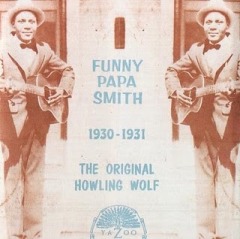Funny Papa Smith – The Original Howlin’ Wolf 1930–1931 (1972)
Funny Papa Smith – The Original Howlin’ Wolf 1930–1931 (1972)

A1 –"Funny Papa" Smith Honey Blues A2 –"Funny Papa" Smith Seven Sisters Blues Part 1 A3 –"Funny Papa" Smith Seven Sisters Blues Part 2 A4 –J. T. "Funny Paper" Smith Hungry Wolf A5 –"Funny Papa" Smith And Magnolia Harris Mama's Quittin' And Leaving Part 1 Vocals – Magnolia Harris A6 –"Funny Papa" Smith And Magnolia Harris Mama's Quittin' And Leaving Part 2 Vocals – Magnolia Harris A7 –"Funny Papa" Smith Country Jail Blues B1 –"Funny Papa" Smith Howling Wolf Blues Part 1 B2 –"Funny Papa" Smith Howling Wolf Blues Part 2 B3 –"Funny Papa" Smith Corn Whiskey Blues B4 –"Funny Papa" Smith Hoppin' Toad Frog B5 –"Funny Papa" Smith Good Coffee Blues B6 –"Funny Papa" Smith And Dessa Foster Tell It To The Judge Part 1 Vocals – Dessa Foster B7 –"Funny Papa" Smith And Dessa Foster Tell It To The Judge Part 2 Vocals – Dessa Foster Vocals, Guitar – Funny Papa Smith
J.T. "Funny Paper" Smith was a pioneering force behind the development of the Texas blues guitar style of the pre-war era; in addition to honing a signature sound distinguished by intricate melody lines and simple, repetitive bass riffs, he was also a gifted composer, authoring songs of surprising narrative complexity. A contemporary of such legends as Blind Lemon Jefferson and Dennis "Little Hat" Jones, next to nothing concrete is known of John T. Smith's life; assumed to have been born in East Texas during the latter half of the 1880s, he was a minstrel who wandered about the panhandle region, performing at fairs, fish fries, dances and other community events (often in the company of figures including Tom Shaw, Texas Alexander and Bernice Edwards). Smith settled down long enough to record some 22 songs between 1930 and 1931, among them his trademark number "Howling Wolf Blues, Parts One and Two"; indeed, he claimed the alternate nickname "Howling Wolf" some two decades before it was appropriated by his more famous successor, Chester Burnett. (The true story behind Smith's more common nickname remains a matter of some debate -- some blues archivists claim he was instead dubbed "Funny Papa," with the "Funny Paper" alias resulting only from record company error.) His career came to an abrupt end during the mid-'30s, when he was arrested for murdering a man over a gambling dispute; Smith was found guilty and imprisoned, and is believed to have died in his cell circa 1940.
download (mp3 @320 kbs):
Last Updated (Wednesday, 27 January 2021 09:46)








